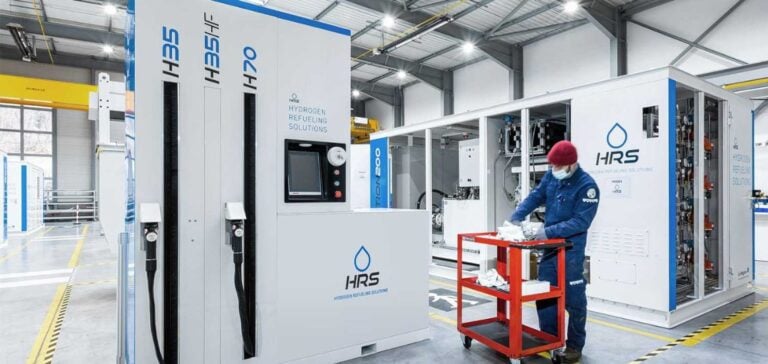HRS (Hydrogen Refueling Solutions) announces that it has won an order in Italy to supply an HRS14 hydrogen refueling station.
This contract marks the first time HRS has entered the Italian market, an area identified as key for the development of hydrogen infrastructures.
The station, which will be installed by the end of 2025, is designed to meet the hydrogen refueling needs of various types of vehicles, including passenger cars, trucks, buses and industrial vehicles.
This initiative is in line with Italy’s objectives for the decarbonization of road transport.
The country plans to invest 230 million euros to develop at least 40 refuelling stations by 2026, mainly along major roads and near ports and logistics centers.
This ambitious program is in line with European Union directives aimed at reducing greenhouse gas emissions through the expansion of clean mobility infrastructures.
A booming market supported by subsidies
The HRS project in Italy is subject to national and European subsidies.
Funding will be confirmed by the end of November 2024, when the deployment program can be officially launched.
This approach is part of an overall strategy to support investment in hydrogen infrastructure across Europe, a fast-growing sector that benefits from incentive policies at EU level.
Italy, with its drive to become a regional leader in the hydrogen sector, offers interesting opportunities for companies specializing in decarbonation technologies.
By working with local partners like Simplifhy, HRS is positioning itself to capture a share of this growing market.
The deployment of these dual-pressure stations meets a growing demand for infrastructure capable of supporting the development of hydrogen mobility.
Hydrogen market outlook in Italy
The expansion of Italy’s hydrogen station network is an essential component of national and European efforts to reduce dependence on fossil fuels.
This strategy is supported by a series of regulatory and financial measures designed to encourage the adoption of hydrogen-powered vehicles and stimulate the production of green hydrogen.
Companies involved in this sector, such as HRS, have to adapt to a framework that is increasingly favorable to technological innovation and the industrialization of sustainable solutions.
In this context, the Italian market stands out for its rapid growth potential, fuelled by government initiatives and substantial financial support.
Collaboration with local players enables HRS to strengthen its position and facilitate the acceptance of its technological solutions in a competitive market.
Although this strategic positioning is subject to the receipt of subsidies, it is in line with our strategy of anticipating medium-term market needs.
The role of local partnerships in hydrogen deployment
Partnerships play a key role in HRS’s expansion in Italy.
By partnering with Simplifhy, a local company specializing in hydrogen, HRS benefits from in-depth market knowledge and direct access to Italian stakeholders.
This collaborative approach is essential for navigating the regulatory landscape and maximizing the impact of investments in the sector.
The HRS14 station, with its refuelling capacity of up to 14 kg/hour, illustrates the potential for rapid deployment of hydrogen solutions adapted to the diversity of industrial and commercial mobility needs.
This type of dual-pressure station is particularly relevant in environments where several types of vehicle need to coexist, optimizing infrastructure efficiency.
Challenges and prospects for hydrogen in Europe
Italy is not an isolated case; it is part of a wider trend in Europe, where many countries are increasing their investment in hydrogen infrastructure.
The European Commission, through various initiatives, is encouraging member states to adopt hydrogen strategies to meet 2050 climate targets.
Industry players and governments are working closely together to develop a pan-European fuelling network capable of supporting the energy transition.
The installation of stations like those of HRS is crucial to supporting this transition, by facilitating the adoption of cleaner transport technologies.
However, the development of this infrastructure requires not only substantial investment, but also coherent policies and strategic partnerships between the private sector and governments.






















